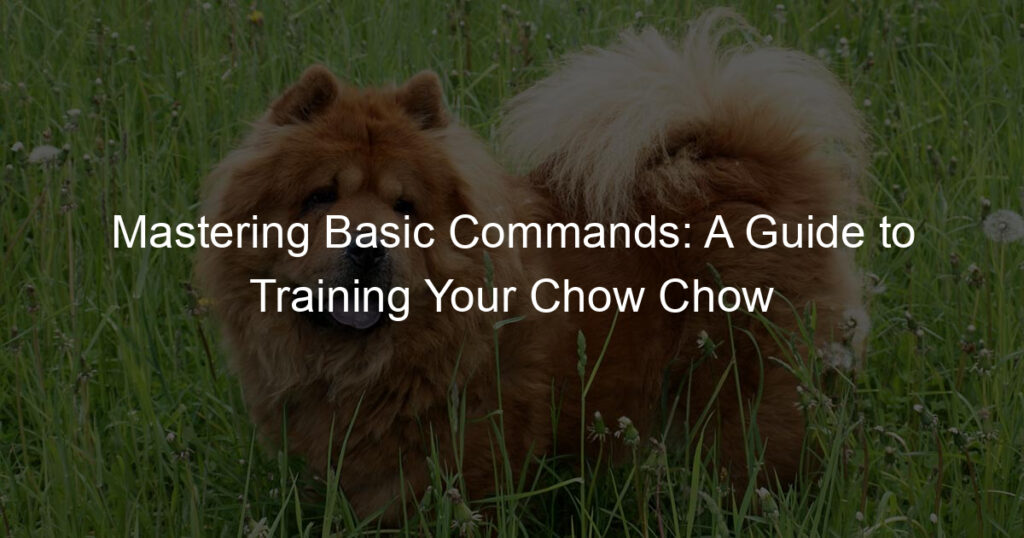
Introduction: Understanding Your Chow Chow’s Barking
Chow Chows are known for their unique and distinctive barking. But what does it mean? And is it normal? In this section, we will delve into the reasons behind your Chow Chow’s barking, understand their behavior, and explore whether their noise issues are normal or not.
Chow Chows bark for a variety of reasons. They may be expressing their feelings, alerting you to something they perceive as a threat, or simply trying to communicate with you. It’s important to remember that barking is a natural behavior for dogs, and it’s one of the main ways they communicate.
Chow Chows are known for their independent and aloof nature. They are not as outgoing or sociable as some other breeds, but this doesn’t mean they don’t enjoy companionship. Understanding your Chow Chow’s behavior can help you better communicate with them and address any potential issues. For example, if your Chow Chow is barking excessively, it could be a sign of boredom or anxiety.
While some barking is normal for Chow Chows, excessive noise can be a sign of a problem. If your Chow Chow is barking more than usual, it’s important to investigate the cause. It could be due to a physical issue, like pain or discomfort, or a behavioral issue, like anxiety or fear. In any case, it’s always a good idea to consult with a veterinarian or a professional dog trainer if you’re concerned about your Chow Chow’s barking.
In the following sections, we will explore how to identify barking problems in Chow Chows, provide training tips to manage their behavior, and offer practical solutions to deal with their barking. We will also share success stories of others who have successfully managed their Chow Chow’s barking. So, let’s embark on this journey of understanding and training your Chow Chow together.
Chow Chow Barking Problems: Identifying the Issue
Understanding the nature of your Chow Chow’s barking can help you identify any potential issues. Let’s delve into the common barking problems and when to be concerned about excessive barking.
-
- Common Chow Chow Barking Problems
Chow Chows are known for their distinct bark. However, there are several common problems that Chow Chow owners often face. These include:
-
-
- Barking at strangers: Chow Chows are naturally protective and may bark excessively at unfamiliar people or animals.
- Barking when left alone: Chow Chows are social animals and may bark excessively when left alone for extended periods.
- Barking for attention: Chow Chows may bark to get your attention, especially if they are bored or want to play.
- Chow Chow Excessive Barking: When to be Concerned
-
While some level of barking is normal for a Chow Chow, excessive barking can be a sign of a deeper issue. You should be concerned if:
-
- Your Chow Chow’s barking is disruptive: If your Chow Chow’s barking is causing disturbances in your household or neighborhood, it may be a sign of a problem.
- Your Chow Chow barks for no apparent reason: If your Chow Chow barks excessively without a clear trigger, it could indicate stress, anxiety, or a health issue.
- Your Chow Chow’s barking is accompanied by other unusual behaviors: If your Chow Chow is barking excessively and also showing signs of aggression, fear, or other unusual behaviors, it’s time to consult a professional.
Understanding your Chow Chow’s barking habits is the first step in addressing any potential issues. In the next section, we’ll discuss some practical solutions for managing Chow Chow barking.
Managing Chow Chow Behavior: Training Tips
Training your Chow Chow can be a rewarding experience, but it’s important to approach it with the right techniques. Let’s explore some fundamental tips to get started.
Chow Chow Training Tips: Getting Started
Before you start training your Chow Chow, it’s important to understand three key principles: establishing a routine, using positive reinforcement techniques, and maintaining consistency. These principles will form the foundation of your training approach.
- Establishing a Routine
Chow Chows thrive on routine. They like to know what to expect and when to expect it. A consistent routine can help your Chow Chow feel secure and understand what is expected of them. This routine can include regular feeding times, walk times, and training sessions. Remember, a well-structured routine can make training easier for both you and your Chow Chow.
- Positive Reinforcement Techniques
Positive reinforcement is a powerful training tool. This technique involves rewarding your Chow Chow for good behavior, which encourages them to repeat it. Rewards can be anything your Chow Chow loves, like treats, toys, or praise. The key is to reward them immediately after they perform the desired behavior, so they associate the reward with their action.
- Consistency is Key
Consistency is crucial in dog training. This means rewarding good behavior and discouraging bad behavior consistently. If you’re inconsistent, your Chow Chow may become confused about what is expected. Consistency also applies to everyone in the household. Everyone should use the same commands and reward system to ensure your Chow Chow understands what is expected.
Remember, training your Chow Chow is a journey, not a destination. It takes time, patience, and consistency. But with the right approach, you can help your Chow Chow become a well-behaved and happy member of your family.
Training Chow Chow Not to Bark: Advanced Techniques
Training your Chow Chow to stop barking doesn’t have to be a daunting task. With the right strategies and a little patience, you can teach your furry friend to communicate in a more pleasant way. Let’s explore some advanced techniques that can help you achieve this.
- Distraction and Redirection
Distraction is a powerful tool in dog training. When your Chow Chow starts barking, try to distract them with a toy or a treat. This will break their focus on whatever is causing them to bark. Once their attention is diverted, you can redirect their energy towards a more positive behavior, like sitting or lying down. Remember, the goal is not to reward the barking, but to reward the silence that follows the distraction.
- Teaching the ‘Quiet’ Command
Teaching your Chow Chow the ‘quiet’ command can be very effective. Start by saying ‘quiet’ in a calm, firm voice when your dog barks. If they stop barking, reward them with a treat or praise. Repeat this process until your dog associates the command with the action. It may take time, but consistency is key. With practice, your Chow Chow will learn to respond to the ‘quiet’ command, even without the promise of a treat.
- Using Professional Training Aids
There are many professional training aids available that can assist in curbing your Chow Chow’s barking. These include anti-bark collars, ultrasonic devices, and even professional dog training services. Anti-bark collars can emit a harmless spray or a slight static shock when your dog barks, discouraging the behavior. Ultrasonic devices emit a high-pitched sound that only dogs can hear, which can distract them from barking. Professional dog training services can provide personalized training plans and expert guidance. However, these should be used as a last resort and always under the guidance of a professional.
Remember, training a dog requires patience and consistency. It’s important to understand that barking is a natural behavior for dogs, and it’s our job as pet owners to teach them when it’s appropriate. With these advanced techniques, you’ll be well on your way to a quieter, happier home with your Chow Chow.
Dealing with Chow Chow Barking: Practical Solutions
Managing the barking of your Chow Chow may seem challenging, but with the right approach, it can be done effectively. Here are some practical home remedies that can help in controlling your Chow Chow’s barking.
Chow Chow Bark Control: Home Remedies
Home remedies are often the first line of defense when it comes to managing your Chow Chow’s barking. Here are some strategies you can implement at home:
- Creating a Calm Environment: Chow Chows are sensitive dogs that can react to changes in their environment. If your dog is barking excessively, it may be due to a stressful or chaotic environment. Try to minimize loud noises, sudden changes, and other potential stressors. A calm and predictable environment can help reduce your Chow Chow’s anxiety and, in turn, its barking.
- Providing Ample Exercise and Mental Stimulation: Chow Chows are active dogs that require regular physical and mental stimulation. Without it, they may resort to barking out of boredom. Regular walks, playtime, and mental stimulation games can help keep your Chow Chow engaged and less likely to bark excessively.
- Addressing Potential Triggers: If your Chow Chow’s barking seems to be triggered by specific events or stimuli, it’s important to identify and address these triggers. This could be anything from a passing car to the presence of other animals. Once you’ve identified the triggers, you can work on desensitizing your Chow Chow to them or managing its exposure to these triggers.
Remember, every dog is unique, and what works for one Chow Chow may not work for another. It’s important to be patient and consistent in your approach. With time and effort, you can help manage your Chow Chow’s barking and create a more peaceful home environment.
Chow Chow Barking Solutions: Professional Help
While home remedies can be effective, there are times when professional help may be necessary for managing your Chow Chow’s barking. Here are some scenarios when you should consider seeking professional assistance:
- When to seek professional help
If your Chow Chow’s barking is causing distress to you or your neighbors, or if it’s leading to aggressive behavior, it’s time to seek professional help. This is particularly important if you’ve tried various home remedies and training techniques without success. Remember, it’s not a failure to ask for help. It’s about ensuring the well-being of your pet and those around you. - Working with a dog behaviorist
A dog behaviorist is a professional who understands the reasons behind a dog’s behavior and can provide tailored solutions. They can observe your Chow Chow’s behavior in different situations and identify triggers that may be causing excessive barking. Working with a behaviorist can provide you with the tools and techniques to manage your Chow Chow’s barking effectively. - Considering obedience classes
Obedience classes are a great way to train your Chow Chow to follow commands and behave appropriately. These classes not only teach your dog to obey commands but also help them socialize with other dogs, which can reduce anxiety and excessive barking. Many pet owners have found obedience classes to be a successful solution for managing their Chow Chow’s barking.
In conclusion, professional help can be a valuable resource in managing your Chow Chow’s barking. Whether it’s working with a behaviorist or enrolling your dog in obedience classes, these options can provide effective solutions for excessive barking. Remember, every dog is unique, and what works for one Chow Chow may not work for another. It’s about finding the right solution that works for your pet.
Case Studies: Success Stories in Managing Chow Chow Barking
Let’s explore some real-life examples of Chow Chow owners who successfully managed their dogs’ barking issues. These case studies highlight the effectiveness of different strategies and provide valuable insights for other Chow Chow owners facing similar challenges.
-
Case Study 1: Overcoming Separation Anxiety
Meet Bella, a two-year-old Chow Chow who used to bark excessively whenever her owner, Sarah, left the house. Sarah realized that Bella was suffering from separation anxiety. She decided to tackle this issue head-on. She started by leaving Bella alone for short periods, gradually increasing the duration. Sarah also made sure to keep her departures and arrivals low-key to avoid triggering Bella’s anxiety. Over time, Bella’s barking reduced significantly. This case study demonstrates that with patience and consistency, separation anxiety and its associated barking can be managed effectively.
-
Case Study 2: Curbing Territorial Barking
Next, we have Max, a Chow Chow known for his territorial nature. His owner, John, noticed that Max would bark excessively whenever someone approached their property. John decided to use positive reinforcement to curb this behavior. He would reward Max with treats and praise whenever he remained calm as someone approached. Over time, Max began to associate calm behavior with rewards, reducing his territorial barking. This case study shows how positive reinforcement can be a powerful tool in managing territorial barking.
-
Case Study 3: Reducing Fear-Based Barking
Finally, let’s look at Luna, a Chow Chow who would bark excessively out of fear whenever she encountered new people or environments. Her owner, Emily, decided to expose Luna to new experiences gradually, always ensuring Luna felt safe and comfortable. Emily would also reward Luna for calm behavior in these situations. Over time, Luna’s fear-based barking decreased significantly. This case study highlights the importance of gradual exposure and positive reinforcement in managing fear-based barking.
In conclusion, these case studies illustrate that with patience, consistency, and the right strategies, it is possible to manage your Chow Chow’s barking effectively. Remember, every dog is unique, and what works for one might not work for another. It’s all about finding the right approach for your Chow Chow.
Conclusion: Embracing the Journey of Training Your Chow Chow
Training your Chow Chow can be a challenging yet rewarding journey. It’s not just about curbing the barking problems; it’s about understanding your furry friend better and building a stronger bond with them. Here are some key takeaways to remember as you embark on this journey.
-
- Patience and Perseverance
Training a Chow Chow requires a lot of patience and perseverance. Remember, it’s not a one-day job. It’s a process that takes time. You might encounter setbacks, but don’t let them discourage you. Keep trying, and eventually, you will see progress.
-
- Enjoying the Process
Training should not be seen as a chore but as an opportunity to spend quality time with your Chow Chow. Make the training sessions fun and enjoyable for both of you. This will not only make the process easier but also help in strengthening your bond.
-
- Building a Stronger Bond with Your Chow Chow
Training your Chow Chow gives you a chance to understand them better. It helps you communicate with them more effectively and build a stronger bond. Remember, a well-trained Chow Chow is not just a well-behaved pet, but a happy and content one.
In conclusion, training your Chow Chow is a journey that requires patience, perseverance, and a positive attitude. Embrace the process, enjoy the moments, and celebrate the milestones. Remember, every step you take towards training your Chow Chow brings you one step closer to a stronger, deeper bond with your furry friend.














